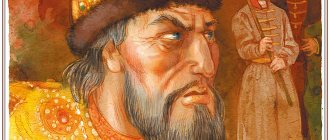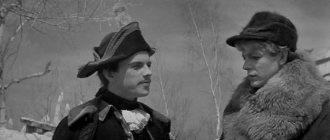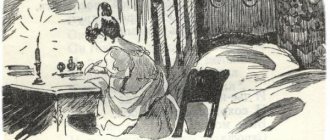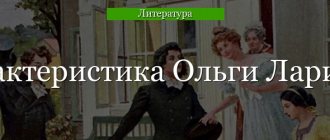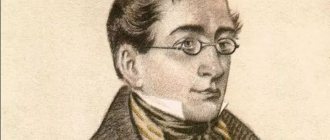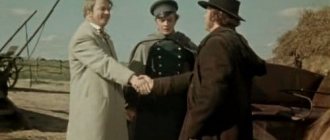- Essays
- On literature
- Pushkin
- Comparative characteristics of Onegin and Lensky
Onegin and Lensky are the central figures of the poem "Eugene Onegin". To better understand the essence of these characters, clarify their character, and study the author's idea, you should turn to the comparative characteristics of these heroes.
Onegin was born and raised in a noble family, and his tutor was involved in his upbringing from infancy. The child was surrounded by endless care and luxury, and thus had nothing in common with truly Russian national foundations. His entire way of life was subject to aristocratic ideals, compliance with which was put at the forefront.
Lensky is described as an attractive young man, full of youthful enthusiasm, and also very rich. The author does not talk about the nature of the hero’s upbringing.
As for education, we can say about Onegin that he learned a lot, but extremely superficially. His education is not bad, but does not provide deep knowledge. It is interesting that, unlike Russian, Onegin knows French perfectly. In addition, he is an excellent conversationalist, he can support almost any conversation and express his opinion on various issues. Onegin received a good history education, once studied political economy, and has an understanding of how society and the state work.
Vladimir Lensky is a student. An intelligent young man interested in philosophy and poetry. He studied in Germany, and, apparently, this promised him a wonderful future. And yet, as it turned out, “...the destiny of the ordinary poet awaited him.”
From the point of view of life ideals, Onegin and Lensky are very different. Eugene strives for harmony through the internal struggle of the eternal (national) and the temporary (that which has become entrenched in the hero’s personality as a result of social influence and foreign philosophy). Lensky's ideal is love, bright and true, as well as faithful, sincere friendship.
By character, Onegin is extremely contradictory and unpredictable. Surely one can say about him that he is a lazy, proud, cold person. Onegin is not at all shy about flattery and hypocrisy. In addition, he is a big fan of slander and criticism. For society, he is an extra person, he stands out among people and strives to find himself in this world, to understand the meaning of his life. He is disgusted with work, he is overcome by blues and boredom, he is full of skepticism. All these qualities characterize him as an unnecessary, superfluous person.
Vladimir Lensky is the opposite of Onegin. A true romantic, devoid of a rebellious spirit. An inspired dreamer, sincere, always striving to solve a mystery, a riddle. This is his meaning of life. The main task of this character is to emphasize Onegin’s character thanks to the contrasting differences between these heroes. They have one thing in common - the lack of a clear goal in life, lack of strength and fortitude.
Option 2
Two young people, by the will of fate, live next door. They seem to be the same, but at the same time, they are so different. Onegin is a hereditary nobleman. He was raised by a governess, then by a French tutor. They taught him little by little and didn’t force him too much. But at the same time, he knew French perfectly, spoke and wrote in it. In those years, it was possible not to know your native Russian language. But it was impossible not to know French. Society immediately rejected such a person.
Onegin knew everything superficially. And classical literature, and history, and social sciences. With a scholarly air, he reasoned spatially about what he did not know. This was enough to keep the conversation going.
Lensky. A handsome man with shoulder-length black curls, a rich guy. Pushkin does not specify what his ideals are. Studied in Germany, at the university. He was interested in Kant's philosophy. His future is the miserable existence of a poet.
What do our heroes believe in and what do they strive for? Onegin strives for harmony. Lensky believes in eternal love and holy friendship until the grave. Typical maximalism of youth. That’s right, Onegin is already twenty-six years old (it’s time to come to his senses and start a family). Lensky is eighteen years old. I haven't walked around yet.
Onegin is lazy, but why does he need to work? He's a nobleman. Hypocritical, flattering, sarcastic in tongue. Loves to show off and play in public. He is superfluous at that celebration of life.
Lensky is a naive young man. Full of delight, dreamy, romantic nature. Not yet spoiled by life and people. Trying to find his meaning in life. They shade each other, like black and white, like day and night. But at the same time, they are very similar. They have no future, no real cause. They waste their days aimlessly.
Onegin is writing some epigrams. He was not enough for serious poetry. He couldn't even distinguish one meter of verse from another. Lensky is a dreamy romantic. Secretly writes poems about love. He can be called the singer of love. And Onegin? This skeptic, who has seen everything and knows everything. Doesn't believe in love.
Lensky is still a naive boy. Idealizes both Olga and Onegin and their friendship. He behaves freely in both male and female society. Therefore, he does not see that Olga is reckless and naive, and not very smart, if she is crazy about his mediocre poems.
Onegin has already grown out of short teenage pants. He acquired a cold mind, prudence, and was completely disillusioned with life. He dried himself off at balls and in social salons, learned small talk and flirting. In my soul I became like an old bilious skeptic who has seen everything, knows everything, and does not expect anything good from life, because he knows its other side.
It’s just not clear how such two different people could be friends. There was no one else nearby with whom to communicate during the long empty evenings.
Questions of good and evil in the relationships of the main characters
Among the intelligentsia of that time, Rousseau’s (writer and French philosopher) treatise “The Social Contract” was very popular. It touched upon the most important social problems. The most pressing issue was the state structure. The problem of the relationship between the authorities and the people, who had the right to overthrow the government that violated the agreement between the state union and the community of citizens, was revealed. The existing situation created both political and economic difficulties in Russia. Progressive-minded representatives of the nobility tried to find a solution to existing problems by improving and introducing farming techniques and the use of machinery. Onegin and Lensky, who would be incomplete without indicating their type of activity, also thought about this question. The first was the owner of waters and factories, and the second was a wealthy landowner. Ethical problems, questions of good and evil, often became the focus of young people's attention. Moral theoretical principles, refracted in the characters’ characters, determine both their views and their actions.
Essay Comparative characteristics of Onegin and Lensky
The novel in verse “Eugene Onegin” is one of the most significant works in the work of A.S. Pushkin, on which the writer worked for about 8 years. In the novel, the author showed the life of the young nobility of the 19th century and highlighted the main features of the society of that era. The central characters of the story are two very bright, dissimilar personalities - a young rake, bored in secular society - Eugene Onegin and his young friend with a pure and noble soul, Vladimir Lensky. Despite the difference in characters and life principles, these people converge and spend a lot of time together. Let's try, based on the characteristics of the two heroes that the writer provided to the reader, to find out what made them become friends, albeit for a short time.
Let's start with the fact that the heroes had that age difference, which is considered quite large in their youth: Onegin was 25 years old, Lensky had recently turned 18. Onegin considered himself a more experienced person in the affairs of secular society, in matters of love, so very often listened to Lensky’s “young nonsense” with a smile. Evgeniy's soul managed to cool down and turn into stone, while Vladimir's ardent temper was as mobile and unpredictable as a sea wave.
Both heroes received a fairly good education. Onegin was educated at home, first as a governess, and then, when the boy grew up, she was replaced by a French monsieur, who taught Eugene “half-jokingly.” But one way or another, he received an education that allowed him to be considered not stupid in society: he knew French perfectly, could translate from Latin, and understood economics (he read Adam Smith). In terms of intelligence, he stands much higher than his peers. But endless balls, love affairs, theaters made the hero gradually begin to lose the taste and meaning of life. His mind cooled, his ardent heart cooled down: Onegin drove himself into a deep melancholy, which accompanied him everywhere like a “shadow.”
Evgeniy is trying to look for the purpose of life in some kind of work: he writes poetry, reads. But this activity does not find a response in his soul, and he leaves it. In the village, where Evgeniy arrived on inheritance matters, he also strives to occupy himself with something: he abolished the corvee, replacing it with a light quitrent. But selfishness and hostility to work win in him. He again attends balls and takes part in love affairs. Onegin is the person who is able to step over the feelings of other people, to cause pain and suffering to those who love him. Having received a challenge to a duel, and feeling that he was wrong, he still accepts the challenge and kills his best, and maybe even only, friend. Why did he do this? No matter how Onegin despised the society in which he lives, he still found himself dependent on its opinion. The death of Vladimir completely turned Evgeniy’s life upside down. He becomes more responsive to the experiences of other people. The feeling of boundless guilt and pangs of remorse help the hero to feel life again and open his heart to love. But it is precisely in love that he suffers a complete collapse, perhaps this becomes a punishment for the crime he committed.
The opposite of Onegin in the work is Vladimir Lensky. This hero plays a significant role in understanding the character of Eugene. Lensky is younger than his friend, he received his education in Germany, but what he studied is not told to the reader. The hero’s spiritual world is completely opposed to Onegin’s worldview. Lensky is a poet, his soul is not at the mercy of the intrigues of the world, his mind is covered with a beautiful world of dreams. Vladimir believes in true friendship, in sincere bright love, in the honesty and decency of people. In his own way, this hero is a little naive. But Lensky is a lively, active person, he loves to live and enjoys life.
But what made such different people come together? Probably, after all, they were similar: both belonged to the generation of young nobles, both were not stupid thinking people who despised the emptiness and corruption of the world. Lensky's enthusiastic soul is in constant search of something beautiful. Onegin looks down on his naivety, believing that this is a temporary ardor of a young man, which will pass over the years and cool down. No one knows how life would have dealt with Lensky's fate. Perhaps he would have become a Decembrist, or maybe a simple man in the street, slowly losing his taste for life.
Both heroes are deep thinking individuals. Their inner world is very rich and genuine. The feeling of realizing his mistakes comes to Evgeny too late, only after he takes his friend’s life. Probably, Onegin simply became a victim of a cynical empty society, but he also found his victims in his best friend and in the girl who fell in love with him. He was never able to get out of the vicious circle of passions.
The tragedy of the relationships between the central characters
Onegin and Lensky, whose comparative characteristics cannot be done without mentioning their personal qualities, were of different ages. Vladimir is younger, his ardent soul has not yet been spoiled by life. He looks for beauty everywhere. Onegin, who had gone through everything a long time ago, listened to Lensky’s passionate speeches with a smile, trying to restrain his irony. For Vladimir, friendship was an urgent need. Onegin “was friends for the sake of boredom.” But Evgeny develops a special attachment to Vladimir. When analyzing the duel between Lensky and Onegin, one cannot help but note the priorities that are quite clearly visible in each of them. Thus, the more experienced protagonist, despite his contempt for the world, valued his opinion and was afraid of reproaches and ridicule. Perhaps it was precisely because of this false sense of honor that Onegin accepted Lensky’s challenge. Vladimir defended the purity of his romantic ideas from his friend’s skepticism. Taking Onegin's unsuccessful joke as betrayal and treason, Lensky challenges him to a duel.
Comparison of Onegin and Lensky for 9th grade
The main characters of the beautiful and fascinating novel “Eugene Onegin” are a nobleman from the capital Eugene and a rich landowner who recently returned from abroad, Vladimir Lensky.
The images of the young people are very similar: both belong to high society, both received a decent education, while one is disappointed in people, gloomy, embittered egoist, the other is enthusiastic, sincere, bright.
Onegin has progressive views, a sharp tongue, who knows how to impress others with a meaningful conversation on any topic and is thoughtfully silent when necessary. Having acquired superficial knowledge, Evgeniy nevertheless possessed sufficient erudition to be known to those around him as an intelligent person. In the environment of metropolitan society, he learned to be hypocritical and flatter. He is disgusted by the big world with its way of life, endless balls, masquerades, trips to the theater, dinner parties. He realizes that envy and slander reign in the world, that people waste themselves on trifles, meaninglessly wasting their lives. But Onegin is not accustomed to work, he has neither the desire nor the strength to change anything in his life. Lack of willpower and the habit of wasting time aimlessly lead to the hero losing interest in his surroundings and falling into deep melancholy. He was fed up with social life, he wanted peace and solitude. So he ended up in the village, where he became close to Vladimir Lensky.
Unlike Onegin, Lensky is an exalted nature, a dreamer, a romantic, and a talented lyricist. Despite the excellent education received at a German university, he has absolutely no knowledge of life and deliberately remains in this ignorance. His faith in ideals: friendship, sincere love is so strong that a collision with harsh reality leads him to despair. However, such traits do not prevent him from doing an excellent job with the household at the age of 18, to the envy of all his neighbors. Thus, Vladimir proves himself to be a practical, sensible businessman. At the same time, his ardor and determination sometimes leads to rash actions. He unleashes his anger on Onegin, his friend yesterday, and today the despicable tempter of the innocent heart of his beloved. After killing Lensky in a duel, Onegin tries to escape from the remorse that tormented him and goes on a trip.
Pushkin in his novel notes that young people, full of strength, capable of great things, are forced to vegetate in melancholy and despondency, or die, only because society, the environment that surrounds them from birth, makes them unhappy
Vladimir
Lensky had a poetic talent that revealed romantic moods in him. He sees the ideal even in the “empty” pretty Olga. Friendship with Onegin means a lot to Lensky. In the depiction of the image of Vladimir, a connection with Decembrist trends is clearly visible, which gives reason to assume the likelihood of his rapprochement with the advanced noble intelligentsia who were preparing the uprising of 1825, which gives him a chance to become the poetic voice of the people. Faith in friendship, freedom, love was the goal of life and the essence of Lensky.
conclusions
It can be said with certainty that Lensky’s death is symbolic. Involuntarily, it leads to the idea that a romantic, a dreamer, an idealist - a person who does not know reality must certainly die when confronted with it. At the same time, skeptics like Onegin remain alive. They cannot be accused of ignorance of reality or idealism. Onegin knows life very well and knows how to understand people well. However, what did this knowledge give him? Unfortunately, nothing but disappointment and melancholy. The consciousness of one's superiority over others puts a person on a rather dangerous path, which ultimately leads to disunity with the world and selfish loneliness. The surviving Onegin is of little use to society and does not become happy.
